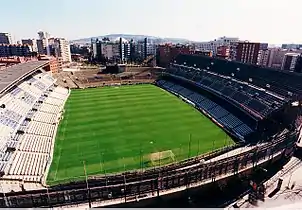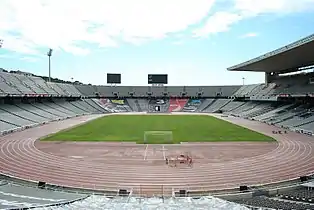RCD Espanyol
Reial Club Deportiu Espanyol (Catalan: [rəˈjal ˈklub dəpuɾˈtiw əspəˈɲɔl də βəɾsəˈlonə]; "Royal Spanish Sports Club of Barcelona"), commonly known as Espanyol, is a professional sports club based in Cornellà de Llobregat, Spain.
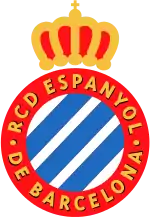 | ||||
| Full name | Reial Club Deportiu Espanyol de Barcelona, S.A.D. | |||
|---|---|---|---|---|
| Nickname(s) | Periquitos (Budgerigars) Blanquiazules (White and Blue) Mágico (Magical) | |||
| Short name | RCDE, ESP, Espanyol | |||
| Founded | 13 October 1900 as Sociedad Española de Football | |||
| Stadium | RCDE Stadium | |||
| Capacity | 40,000[1] | |||
| Owner | Rastar Group | |||
| President | Chen Yansheng | |||
| Head coach | Vicente Moreno | |||
| League | Segunda División | |||
| 2019–20 | La Liga, 20th of 20 (relegated) | |||
| Website | Club website | |||
|
| ||||
| Departments of RCD Espanyol | ||||||||||||||||
|---|---|---|---|---|---|---|---|---|---|---|---|---|---|---|---|---|
|
Founded in 1900, the club plays in the Segunda División for the 2020–21 season, the second division of Spanish football, having been relegated from La Liga in the 2019–20 season. They play their home games at the RCDE Stadium, which holds up to 40,000 spectators. Espanyol has won the Copa del Rey four times, most recently in 2006, and reached the UEFA Cup final in 1988 and 2007. The team competes in the Barcelona Derby against FC Barcelona.
Name
Initially known as the Sociedad Española de Football on its foundation, the name was changed to Club Español de Fútbol in 1901. In 1906, the club folded due to financial reasons and most of the players joined the X Sporting Club. This club won the Campionat de Catalunya three times between 1906 and 1908. In 1909, the club was effectively relaunched as the Club Deportivo Español, and in 1910, they adopted their present-day colours. Espanyol is one of several Spanish football clubs granted patronage by the Spanish crown and thus entitled to use Real in their names and the royal crown on their badge. This right was granted to Espanyol in 1912 by Alfonso XIII and the club subsequently became known as the Real Club Deportivo Español.[2]
Following the abdication of the same king in 1931 and the declaration of the Second Spanish Republic, due to prohibition of royal symbols, the club adopted the more Catalan/republican friendly name, Club Esportiu Espanyol. After the Spanish Civil War, the name was reverted.
The club took the Catalan spelling for its name in February 1995. The word "Deportiu" in Reial Club Deportiu Espanyol de Barcelona is a Catalanised form of the original word "Deportivo" (Castilian), despite the correct word being "Esportiu" in the Catalan language. This choice was made in order to retain the initials "RCD" in the club's name.
History
Foundation and club culture
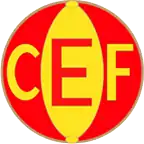
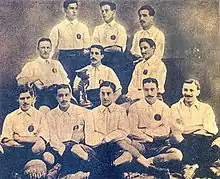
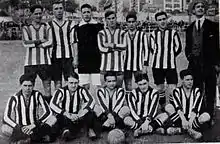
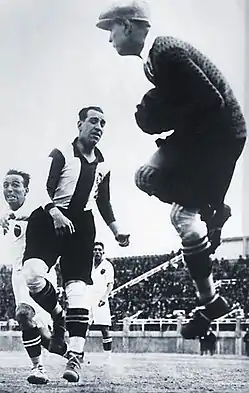
Espanyol was founded on 28 October 1900 by Ángel Rodríguez Ruiz (1879–1959), an engineering student at the University of Barcelona. The club's original home was in the well-off district of Sarrià; Espanyol was the first club in Spain to be formed exclusively by Spanish fans of the game, with the other early clubs having links to Britain or central Europe.
The club originally played in bright yellow shirts, with the colour of the shorts being left to the individual player. A friend of the club founder owned a textile business and happened to have an abundance of yellow material left over from a job. In 1910, the club changed its name to the Club Deportivo Español and chose blue and white stripes as shirt colours and as the central colours of the club badge. Blue and white were chosen in homage to the colours appearing on the shield of the great Sicilian-Aragonese Admiral Roger de Lluria, who sailed the Mediterranean protecting the interests of the Crown of Aragon in the Middle Ages. The club was successful from the very beginning, winning the Campionat de Catalunya in 1903 and subsequently playing in the Copa del Rey.
In 1994, Espanyol created its reserve team, Espanyol B, currently playing in the Segunda División B.
Two UEFA Cup finals (1988–2009)
Javier Clemente was hired in 1986. In his first season, he took the team to a joint-best 3rd place, qualifying for the UEFA Cup. They defeated Borussia Mönchengladbach, A.C. Milan, Inter Milan, TJ Vitkovice and Club Brugge KV to reach the final, losing on penalties to Bayer 04 Leverkusen after a 3–3 aggregate draw.[3] Two relegations followed, but the club remained in La Liga from winning the 1993–94 Segunda División until relegated at the conclusion of the 2019-20 COVID pandemic impacted season.
Paco Flores' Espanyol won the 2000 Copa del Rey Final 2–1 against Atlético Madrid at Mestalla, a first cup win since 1940.[4] Six years later, under Miguel Ángel Lotina, the club won again, this time 4–1 against Real Zaragoza in Madrid, with goals by Raúl Tamudo, Luis García (two) and Coro.[5]
With this cup win, Espanyol entered the UEFA Cup. They won all their group games, before dispatching Livorno, Maccabi Haifa, Benfica, and Werder Bremen to reach the final. In the final, held on 16 May at Hampden Park in Glasgow, Espanyol fell to fellow La Liga side Sevilla, losing 3–1 in a shootout following a 2–2 draw.[6] They became the only football team in UEFA Cup history to remain unbeaten in the tournament, yet not take home the trophy. Walter Pandiani, who would leave the club at the end of the season, was the UEFA Cup's top goalscorer that season. On 9 June 2007, Tamudo became Espanyol's highest-ever goalscorer after surpassing the 111 goals scored by Rafael Marañón, and ended the night with 113.
On 31 May 2009, Espanyol played its last match at the Estadio Olímpico de Montjuic, a 3–0 defeat of Málaga. Espanyol had played in the Estadi Olímpic after moving from their previous ground in Sarria. With the move, club talisman Raúl Tamudo had the unique distinction of having played in three different home stadiums with his club: Sarrià, Montjuïc and, beginning in the 2009–10 season, the Cornellà-El Prat.
Recent years (2009-present)
In January 2009, former Espanyol defender Mauricio Pochettino was hired as manager with the club in the relegation zone – his first senior job.[7] He won 2–1 against rivals Barcelona at the Camp Nou in February to help keep the club up; Barcelona, under Pep Guardiola, won the treble that season.[8]
After 12 seasons playing at the Estadi Olímpic de Montjuïc, Espanyol moved to the Estadi de Cornellá-El Prat. The new stadium was officially inaugurated on 2 August 2009 with a match between Espanyol and Liverpool; Espanyol won 3–0, with Luis García scoring the first goal at the ground, followed by a Ben Sahar double.[9] Six days later, Espanyol captain Daniel Jarque died from a cardiac arrest aged 26 in the Florence neighbourhood of Coverciano, where the club was at the time after playing several fixtures in Italy.[10] Since then, in the 21st minute – his former shirt number – of every Espanyol match, an ovation is made in his honour for a full minute.
After Pochettino left in 2012, the club maintained themselves in the top flight under a series of other managers. In January 2016, Chinese businessman Chen Yansheng took over the club by acquiring a 54% stake.[11] In the 2018–19 season, Espanyol finished 7th, thus returning to the Europa League for the first time since their final run in 2006–07.[12] However, the club suffered relegation for the first time since 1994 the following season, after a 1–0 loss at Barcelona.[13] On 3 August 2020 the club published an official statement urging La Liga to suspend relegation for the 2020-21 season.[14]
Rivalries
El derbi Barceloní
In the first half of the 20th century during the Miguel Primo de Rivera dictatorship (1923–1930), FC Barcelona was seen as a symbol of Catalan identity. This contrasted with RCD Espanyol which cultivated a kind of compliance with the central authority.[15]
In 1918, the municipalities of Catalonia promoted a campaign to ask the Spanish Government for a Statute of Autonomy. FC Barcelona joined that request and the Catalan press recognized FC Barcelona as a major cultural arm of the Catalan independence movement. The city's other team, RCD Espanyol, dissociated itself from the claim due to the former's success on the European stage.[16][17]
Today FC Barcelona is the club that is closer to the political powers in Catalonia. Its last presidents have linked the club with the Catalan independence movement and the holding of a referendum, even though this causes discomfort among some Catalonian fans and those in the rest of Spain who feel neglected and think the team is biased against them.[18] Although some of RCD Espanyol's directors have expressed their independentist ideology the club stays out of politics. It is believed that most of the team's fans are against the independence of Catalonia.[19]
On numerous occasions RCD Espanyol has complained of unfavourable and sometimes directly offensive treatment towards the club in favour of FC Barcelona by some Catalonian public media like TV3.[20][21][22]
Despite these differences in ideology, the derbi (derby) has always been more relevant to Espanyol supporters than those of Barcelona due to the difference in objectives.
Though it is the most played local derby in the history of La Liga, it is also the most unbalanced, with Barcelona overwhelmingly dominant. In the league table, Espanyol has only managed to finish above Barça on three occasions in almost 70 years and the only all-Catalan Copa del Rey final was won by Barça in 1957. Espanyol has the consolation of achieving the largest margin win with a 6–0 victory in 1951.
Espanyol achieved a 2–1 win against FC Barcelona during the 2008–09 season, becoming the first team to defeat Barcelona at Camp Nou in their treble-winning season.[23]
Espanyol lost 0–1 to FC Barcelona on 8 July 2020, to be relegated to the Segunda División.[13]
Stadium
From 1923 until 1997, Espanyol played their home games in Estadi de Sarrià in the Sarrià-Sant Gervasi district of Barcelona. In 1997, they moved to the Estadi Olímpic Lluís Companys on Montjuïc. For the beginning of the 2009–10 season, Espanyol moved into the newly constructed RCDE Stadium (also known as Estadi Cornellà-El Prat) between Cornellà de Llobregat and El Prat de Llobregat.
Competition summary
- 80 seasons in Primera División
- 4 seasons in Segunda División
- 8 participations in UEFA Cup / UEFA Europa League
- 2 participations in Inter-Cities Fairs Cup
- 2 participations in UEFA Intertoto Cup
Achievements
- In 1928, Espanyol became a founding member of La Liga, and in 1929, the team won their first Copa del Rey. Espanyol has completed the highest number of seasons in La Liga without winning the title.
- The team has qualified for the UEFA Cup/Europa League eight times (including the qualifications following their 2000 and 2006 Spanish Cup wins, which in earlier eras would instead have granted entry to the UEFA Cup Winners' Cup) and reached the final in 1988,[24][25][26][27] losing to Bayer Leverkusen of then-West Germany on penalty kicks (3–2), after a two-legged final of contrasts ended level (3–0 in Barcelona, 0–3 in Leverkusen)[28][29] and in 2007, losing to compatriots Sevilla, again on penalties (3–1) after a memorable match at Hampden Park, Glasgow ended 1–1 after normal time, and 2–2 after extra time.
Honours
League
- Winner (1): 1993–94
Regional competitions
- Winners (11): 1903–04, 1905–06, 1906–07, 1907–08, 1911–12, 1914–15, 1917–18, 1928–29, 1932–33, 1936–37, 1939–40
- Winners: 2016[33]
Players
Current squad
- As of 1 February 2021[34]
Note: Flags indicate national team as defined under FIFA eligibility rules. Players may hold more than one non-FIFA nationality.
|
|
Reserve team
Note: Flags indicate national team as defined under FIFA eligibility rules. Players may hold more than one non-FIFA nationality.
|
|
Out on loan
Note: Flags indicate national team as defined under FIFA eligibility rules. Players may hold more than one non-FIFA nationality.
|
|
Retired numbers
21 ![]() Daniel Jarque (posthumous honour) (2002–09)
Daniel Jarque (posthumous honour) (2002–09)
Players with most appearances
- Competitive, professional matches only.
As of 12 September 2020
| Name | Years | La Liga | Segunda División | Copa del Rey | Copa de la Liga | UEFA Cup | Other | Total | |
|---|---|---|---|---|---|---|---|---|---|
| 1 | 1996–2010 | 340 | – | 26 | – | 14 | 9[lower-alpha 1] | 389 | |
| 2 | 1950–1964 | 301 | 14[lower-alpha 2] | 38 | – | – | 4[lower-alpha 3] | 357 | |
| 3 | 1965–1976 | 269 | 31 | 33 | –– | 2 | 11[lower-alpha 4] | 346 | |
| 4 | 1982–1990 | 241 | 33[lower-alpha 5] | 30 | 19 | 10 | – | 333 | |
| 5 | 1994–2006 | 275 | – | 30 | – | 13 | 2[lower-alpha 6] | 320 | |
| 6 | 1974–1984 | 264 | – | 43 | 6 | 6 | – | 319 | |
| 7 | 1979–1988 | 259 | – | 29 | 18 | 9 | – | 315 | |
| 8 | 1974–1983 | 261 | – | 43 | 4 | 6 | – | 314 | |
| 9 | 1993–2003 | 238 | 28 | 32 | – | 10 | 2[lower-alpha 7] | 310 | |
| 10 | 1982–1991 | 216 | 33[lower-alpha 8] | 27 | 15 | 12 | – | 303 |
Notes
- 6 appearances in UEFA Intertoto Cup and 3 appearances in Supercopa de España
- All appearances in La Liga relegation play-offs
- All appearances in Inter-Cities Fairs Cup
- 8 appearances in Inter-Cities Fairs Cup and 3 appearances in Intertoto Cup
- Including 2 appearances in La Liga relegation play-offs
- All appearances in Supercopa de España
- All appearances in Supercopa de España
- Including 2 appearances in La Liga relegation play-offs and 1 appearance in La Liga promotion play-offs
Coaches
Club officials
Current Technical staff
| Role | Name |
|---|---|
| Head Coach | |
| Assistant Coaches | |
| Goalkeeping Coach | |
| Fitness Coach | |
| Analyst | |
| Club Doctors | |
| Physiotherapists | |
| Nutritionist | |
| Kit man | |
| Delegate |
|
Board of Directors
| Role | Name |
|---|---|
| Owner | |
| President | |
| Vice president | |
| Board Secretary | |
| Board Vice Secretary | |
| Board of Directors | |
| Business and Coordination Director | |
| Sport General Area Manager | |
| CEO | |
| Professional Football Director | |
| Professional Football Management | |
| Academy Director | |
| Femenino Football Director | |
| Femenino Sporting Director | |
| Head of Medical Services | |
| Marketing and Commercial Director | |
| Financial Director | |
| Chief Communications Officer | |
| Social area Director | |
| Head of Ciutat Esportiva Dani Jarque's Schools and Academies |
|
| Stadium Director | |
| Office manager | |
| Administration and human resources manager | |
| Security Director | |
| Telecommunications Director | |
| Business Coordination and Expansion in Asia |
|
Presidents
|
|
|
|
Historical departments of RCD Espanyol
Until the 1990s, Espanyol had several sporting sections. In March 2017, the Association of Supporters and Shareholders of RCD Espanyol boosted a project for recovering the sporting sections of the club, but this time without any economic link with the football team. The new multi-sports club was created with the name of Seccions Deportives Espanyol (Sporting sections Espanyol).[36]
Two months later, the Association confirmed that Espanyol would start competing in the 2017–18 season, with a roller hockey team and women's volleyball teams.[37] In the next season, the basketball section was refounded and a new section of handball would be created.
Men's basketball
- Winners (1): 1941
- Winners (2): 1931, 1932
- Runners-up (3): 1941, 1943, 1954
Men's rink hockey
- Winners (11): 1944, 1947, 1948, 1949, 1951, 1954, 1955, 1956, 1957, 1961, 1962
- Runners-up (4): 1946, 1952, 1953, 1958
Women's volleyball
- Winners (3): 1985, 1988, 1991
- Winners (5): 1984, 1985, 1986, 1990, 1992
References
- RCDE Stadium – RCD Espanyol Official Page
- "History". RCD Espanyol. Retrieved 27 January 2018.
- "El Espanyol tocó la gloria ante el Bayer Leverkusen" [Espanyol touched glory against Bayer Leverkusen]. Mundo Deportivo (in Spanish). 4 May 2013. Retrieved 28 February 2020.
- Segurola, Santiago (28 May 2000). "El Espanyol se corona en Mestalla" [Espanyol crowned in Mestalla]. El País (in Spanish). Retrieved 28 February 2020.
- "El Espanyol conquista su cuarta Copa del Rey" [Espanyol win their fourth Copa del Rey]. El Mundo (in Spanish). 12 April 2006. Retrieved 28 February 2020.
- "Palop ensures cup joy for Sevilla". uefa.com. 17 May 2007.
- "Pochettino replaces luckless Mané at Espanyol". UEFA. 20 January 2009. Retrieved 28 February 2020.
- Bate, Adam (1 October 2016). "How Mauricio Pochettino's Espanyol beat Pep Guardiola's Barcelona". Sky Sports. Retrieved 28 February 2020.
- Collins, Ben (2 August 2009). "Reds suffer pain in Spain". Retrieved 28 February 2020.
- "Espanyol stunned by Jarque death". BBC. 8 August 2009.
- "New Espanyol owner aiming for Champions League within three years". The Guardian. 22 January 2016.
- Gillingham, Geoff (30 August 2019). "Friendly Europa League draw for Sevilla, Getafe and Espanyol". Marca. Retrieved 28 February 2020.
- Roche, Calum (9 July 2020). "Barcelona keep title race alive as they relegate rivals Espanyol". Diario AS.
- RCD Espanyol de Barcelona Comunicado Oficial, 3 August 2020
- Missiroli, Antonio (March 2002). "European football cultures and their integration: the 'short' Twentieth Century". Europa (web portal). Retrieved 1 July 2009.
- Burns, Jimmy (November 6, 2017). "In troubled times, FC Barcelona defines modern Catalonia". POLITICO.
- "FC Barcelona, more than a club". www.barcelona.de.
- Temprano, Alejandra (2016-01-11). "El Barça cae en su trampa con el tuit de la vergüenza de Bartomeu". esdiario.es. Retrieved 2017-06-17.
- MARCA.com (2015-09-10). "Joan Collet: "Vamos a dar guerra al Madrid"". MARCA.com (in Spanish). Retrieved 2017-06-17.
- "El Espanyol "exige" la retirada de la campaña 'Si sientes el Barça, sientes Cataluña'". ELMUNDO (in Spanish). Retrieved 2017-06-17.
- BARCELONA, SERGI LÓPEZ-EGEA / (2016-03-03). "Ensenyament retira un texto ofensivo con el Espanyol". El Periódico (in Spanish). Retrieved 2017-06-17.
- "El Espanyol y el Joventut denuncian pensamiento único en Cataluña". Economiadigital (ed. general). Retrieved 2017-06-18.
- "How Mauricio Pochettino's Espanyol beat Pep Guardiola's Barcelona". skysports.com. 1 October 2016.
- Licia Granello (October 22, 1987). "Il Milan è già disperato". la Repubblica (in Italian). p. 25.
- Licia Granello (November 5, 1987). "Un Milan senza attacco Una partita senza storia". la Repubblica (in Italian). p. 33.
- Gianni Mura (November 26, 1987). "Ma l' Inter soffre ancora". la Repubblica (in Italian). p. 23.
- Gianni Mura (December 10, 1987). "L' Inter perde l' ultima chance". la Repubblica (in Italian). p. 23.
- "Finale UEFA Tre gol dell' Espanyol". la Repubblica (in Italian). May 5, 1988. p. 33.
- "Coppa UEFA Il Bayer vince ai rigori". la Repubblica (in Italian). May 19, 1988. p. 23.
- "Spain – List of Cup Finals". Rec.Sport.Soccer Statistics Foundation (RSSSF). Retrieved 9 April 2016.
- "Spain – List of Second Division Champions". Rec.Sport.Soccer Statistics Foundation (RSSSF). Retrieved 9 April 2016.
- "Spain – List of Champions of Catalonia". RSSSF. Retrieved 17 February 2017.
- "El Espanyol gana la Supercopa" [Espanyol win the Supercup]. Mundo Deportivo. Roger Torelló. 25 October 2016. Retrieved 6 May 2018.
- www.rcdespanyol.com, RCD Espanyol -. "First Team - RCD Espanyol". www.rcdespanyol.com.
- "First Team RCD Espanyol Marc Roca Junqué #21". rcdespanyol.com. RCD Espanyol de Barcelona S.A.D. Retrieved 24 December 2018.
- "Pericos sobre ruedas" (in Spanish). La Vanguardia. 15 March 2017. Retrieved 26 May 2017.
- "Reneix el gegant adormit" (in Catalan). L'Esportiu de Catalunya. 26 May 2017. Retrieved 26 May 2017.
External links
| Wikimedia Commons has media related to RCD Espanyol. |
- Official website (in Catalan, Spanish, and English)
- RCD Espanyol at La Liga (in English and Spanish)
- RCD Espanyol at UEFA (in English and Spanish)
